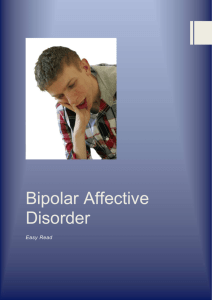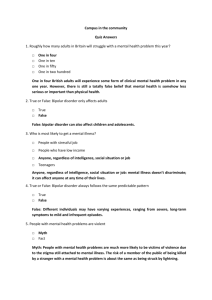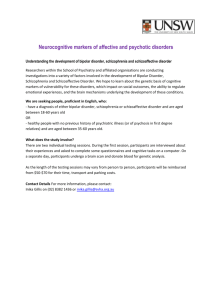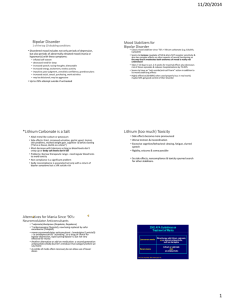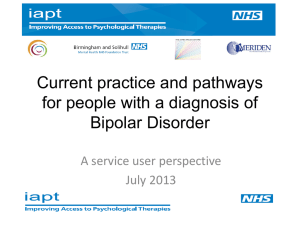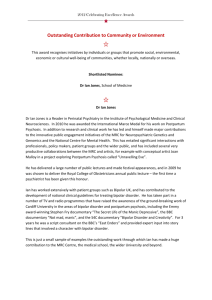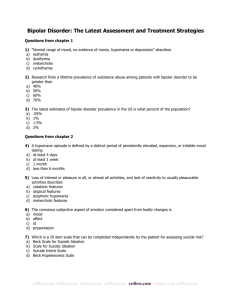Bipolar Disorder
advertisement
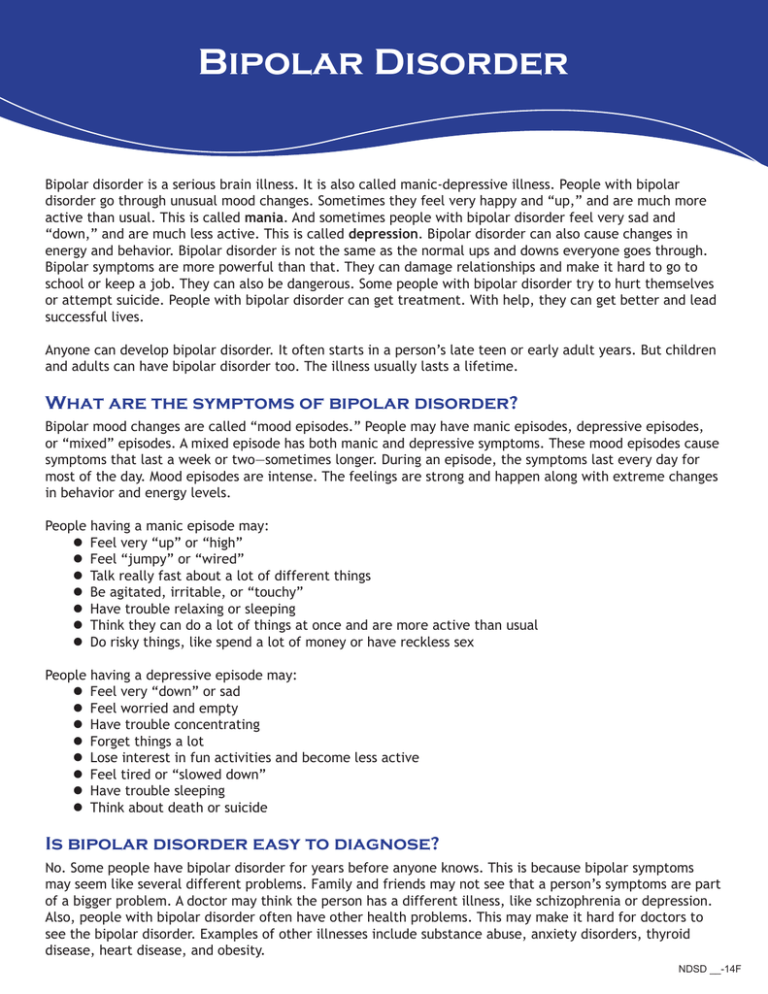
Bipolar Disorder Bipolar disorder is a serious brain illness. It is also called manic-depressive illness. People with bipolar disorder go through unusual mood changes. Sometimes they feel very happy and “up,” and are much more active than usual. This is called mania. And sometimes people with bipolar disorder feel very sad and “down,” and are much less active. This is called depression. Bipolar disorder can also cause changes in energy and behavior. Bipolar disorder is not the same as the normal ups and downs everyone goes through. Bipolar symptoms are more powerful than that. They can damage relationships and make it hard to go to school or keep a job. They can also be dangerous. Some people with bipolar disorder try to hurt themselves or attempt suicide. People with bipolar disorder can get treatment. With help, they can get better and lead successful lives. Anyone can develop bipolar disorder. It often starts in a person’s late teen or early adult years. But children and adults can have bipolar disorder too. The illness usually lasts a lifetime. What are the symptoms of bipolar disorder? Bipolar mood changes are called “mood episodes.” People may have manic episodes, depressive episodes, or “mixed” episodes. A mixed episode has both manic and depressive symptoms. These mood episodes cause symptoms that last a week or two—sometimes longer. During an episode, the symptoms last every day for most of the day. Mood episodes are intense. The feelings are strong and happen along with extreme changes in behavior and energy levels. People having a manic episode may: l Feel very “up” or “high” l Feel “jumpy” or “wired” l Talk really fast about a lot of different things l Be agitated, irritable, or “touchy” l Have trouble relaxing or sleeping l Think they can do a lot of things at once and are more active than usual l Do risky things, like spend a lot of money or have reckless sex People having a depressive episode may: l Feel very “down” or sad l Feel worried and empty l Have trouble concentrating l Forget things a lot l Lose interest in fun activities and become less active l Feel tired or “slowed down” l Have trouble sleeping l Think about death or suicide Is bipolar disorder easy to diagnose? No. Some people have bipolar disorder for years before anyone knows. This is because bipolar symptoms may seem like several different problems. Family and friends may not see that a person’s symptoms are part of a bigger problem. A doctor may think the person has a different illness, like schizophrenia or depression. Also, people with bipolar disorder often have other health problems. This may make it hard for doctors to see the bipolar disorder. Examples of other illnesses include substance abuse, anxiety disorders, thyroid disease, heart disease, and obesity. NDSD __-14F How is bipolar disorder treated? Right now, there is no cure for bipolar disorder, but treatment can help control symptoms. Most people can get help for mood changes and behavior problems. Treatment works best when it is ongoing, instead of on and off. Medication. Different types of medication can help. People respond to medications in different ways, so the type of medication depends on the patient. Sometimes a person needs to try different medications to see which are best. Medications can cause side effects. Patients should always tell their doctor about these problems. Also, patients should not stop taking a medication without a doctor’s help. Stopping medication suddenly can be dangerous, and it can make bipolar symptoms worse. Therapy. Different kinds of psychotherapy, or “talk” therapy, can help people with bipolar disorder. Therapy can help them change their behavior and manage their lives. It can also help patients get along better with family and friends. Sometimes therapy includes family members. Other Treatments. Some people do not get better with medication and therapy. These people may try “electroconvulsive therapy,” or ECT. This is sometimes called “shock” therapy. ECT provides a quick “shock” that can sometimes correct problems in the brain. Sometimes people take herbal and natural supplements, such as St. John’s wort or omega-3 fatty acids. Talk to your doctor before taking any supplement. Scientists aren’t sure how these products affect people with bipolar disorder. Some people may also need sleep medications during treatment. How can I help myself if I have bipolar disorder? You can help yourself by getting treatment and sticking with it. It takes time, and it’s not easy. But treatment is the best way to start feeling better. Here are some tips: l Talk to your doctor about your treatment l Stay on your medication l Keep a routine for eating and sleeping l Make sure you get enough sleep l Learn to recognize your mood swings l Ask a friend or relative to help you stick with your treatment l Be patient about your symptoms; improvement takes time If you’re thinking about hurting yourself, get help quickly. l Call 911, your doctor, or go to the emergency room l Call a toll-free suicide hotline: 1–800–273–TALK (8255) for the National Suicide Prevention Lifeline. The TTY number is 1–800–799–4TTY (4889). Take an anonymous self-assessment. Available 24/7. www.HelpYourselfHelpOthers.org Information provided by the National Institute of Mental Health Screening for Mental Health ®
